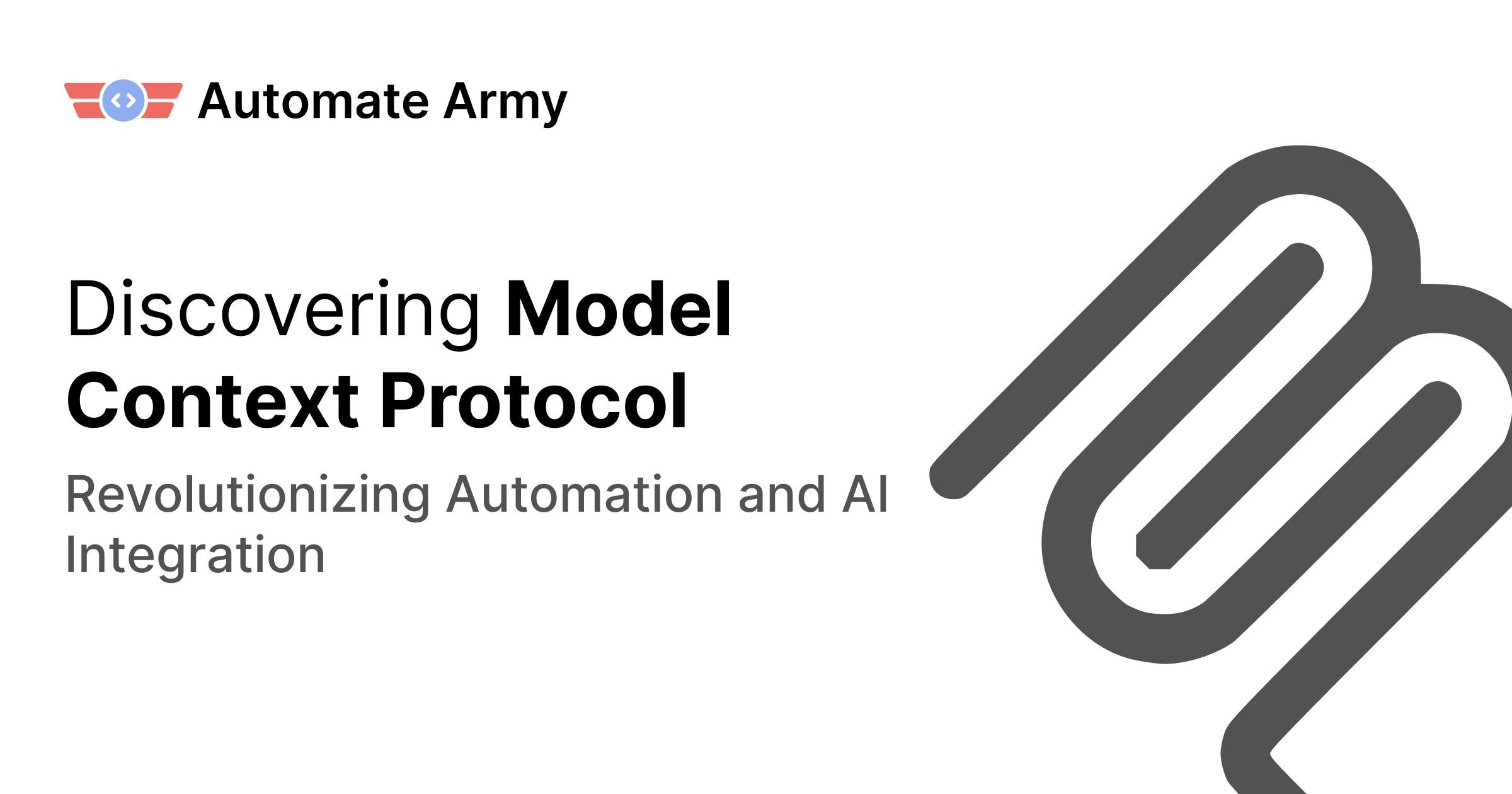Discovering MCP: Revolutionizing Automation and AI Integration
One recent development in the AI space that has the potential to significantly impact the industry is the Model Context Protocol (MCP) by Anthropic. While it may not have grabbed headlines at its release, MCP’s significance cannot be overstated. It addresses one of the largest limitations of natural language models (NLMs) today, opening up new frontiers for AI applications.

Enabling AI to access the outside world
One of the main challenges in AI adoption today is the difficulty of enabling AI systems to interact effectively with the outside world. While tools like embeddings and OpenAI’s Tool Calling offer partial solutions, they often result in fragmented and complex implementations. The Model Context Protocol (MCP) addresses this issue by providing a unified and streamlined framework that simplifies the process of integrating AI with external systems.
MCP enables AI models to connect with external sources via an MCP server, allowing them to do essentially anything:
- Query databases
- Access APIs
- Execute code and commands
This framework bridges the gap between AI and real-world actions, making it easier to integrate third-party services and significantly enhancing the utility of AI systems. By leveraging MCP, AI models can dynamically discover their capabilities, execute commands in real-time, and autonomously perform actions that previously required manual intervention.
What Is MCP?
The Model Context Protocol, developed by Anthropic, is an open standard designed to simplify how AI systems interact with external data sources. By creating secure, two-way connections between data repositories and AI tools, MCP eliminates the need for fragmented integrations, streamlining the process for developers.
MCP’s design is both universal and flexible. Developers can use MCP servers to expose their data or build MCP client applications that connect seamlessly to a variety of systems and tools. If a service offers an API, creating an MCP server for it becomes straightforward, making it easier than ever to integrate external data with AI-powered applications.
Some examples of MCP servers that have already been created are:
- Google Drive
- Github
- Postgres
And the open source community regularly release new MCP servers integrating with all sorts of 3rd party service, for anyone to use!
Why This Matters
The implications of MCP will be profound, offering a glimpse into a future where natural language interfaces like chat and voice become the preferred tools for many tasks.
Imagine interacting with an AI that not only synthesizes information or assists with problem-solving, but also takes the next step by executing actions seamlessly on your behalf—all without requiring human intervention.
This transformative capability eliminates the need for tedious copying and pasting between systems. Instead, AI becomes an active participant in workflows, streamlining processes and making tasks faster and more efficient.
By integrating MCP, businesses and individuals alike can unlock unprecedented levels of productivity, enabling AI to move beyond being a tool where you need to copy paste content back and forth to a tool that can also make actions on your behalf.
A Practical Example: E-commerce Made Smarter
To illustrate how MCP works in practice, let’s look at a real-world example. We recently collaborated with an e-commerce business facing challenges with repetitive order-related questions from internal stakeholders. Customer service representatives frequently asked internally about the status, tracking links or general information about orders, a process that required technical staff to manually look up data by searching order IDs in an app—or in some cases using SQL. This was not only time-consuming but also diverted resources from more critical tasks.
To address this, we implemented an AI bot powered by MCP. The bot could directly access order information by making queries via the MCP server and provide instant responses in natural language. By automating these inquiries, the system drastically reduced response times and improved efficiency.
The results were impressive:
- The technical team’s workload was significantly reduced, allowing them to focus on higher-value projects without being interrupted by these repetitive requests.
- Response times were significantly faster than human lookup, ensuring quicker and more seamless support for customers.
This example highlights how MCP can revolutionize processes, making AI a powerful tool for modern businesses.
What processes can you automate using AI and MCP?
Looking ahead, MCP offers businesses a powerful opportunity to enhance workflows and introduce meaningful automation. By leveraging MCP, organizations can connect AI systems with their data and tools, creating seamless processes that save time and resources. Tasks that previously required expensive manual effort can now be automated or entirely reimagined, freeing up resources.
Imagine automating complex, repetitive workflows—whether it’s processing customer inquiries, managing inventory, or streamlining internal communications. MCP makes it possible to integrate AI into these processes effortlessly, allowing AI to act autonomously and execute real-world tasks.
Businesses across industries can now explore how MCP enables AI to not only analyze and respond but also take action, making operations more efficient and scalable.
Need Help Navigating the AI Landscape?
If you’re excited about the potential of MCP and want to explore how it can revolutionize your business, we’re here to help. Whether it’s building custom automations or integrating cutting-edge AI solutions, let’s set up some time to talk and turn your ideas into reality.